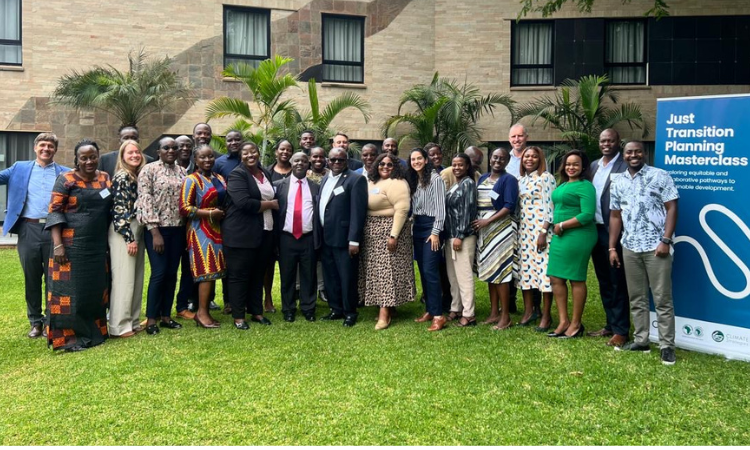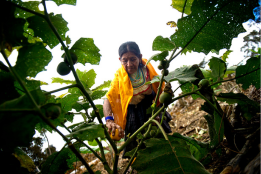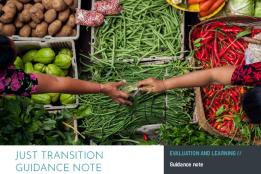CIF’s Masterclass series on planning fair transitions, developed in partnership with the African Development Bank (AfDB) and Climate Strategies, aims to support decision-makers from the global south with the tools and knowledge to navigate structural economic and technological change in ways that are people-centered: i.e., ensure the benefits are widely spread and any adverse impacts on people’s livelihoods are managed fairly.
Through a blend of webinars and an in-person workshop, the Masterclass equips leaders from diverse technical backgrounds to explore key principles for fair transition planning, delve into methods for assessing the social and economic impacts of interventions, consider stakeholder engagement strategies, and hear lessons from international experts with real world experience in planning complex socio-economic changes. Sessions draw on methods and approaches shared in the CIF Just Transition Planning Toolbox.
This page consolidates many of the materials used during the first Masterclass, offering stakeholders easy access to tools, presentations, pre-reading documents, and homework templates, which can be adapted for different needs and contexts.
The first Masterclass featured participants from Ghana, Kenya, Namibia and Uganda and ran from May – September 2024. Stay tuned for the second Masterclass in 2025, which will support policy makers in designing fair nature-based solutions to climate change.

MASTERCLASS STRUCTURE
Over the course of four interactive webinars and an in-person workshop, participants engaged in practical exercises, collaborative discussions, and scenario-based activities designed to deepen their understanding of fair transition planning. Discover key insights and topics participants explored at this synthesis of discussions.
- Onboarding Session: Prior to the first webinar, the Masterclass organizers met virtually with each country team. These introductory meetings gave country team members a chance to meet one another, gain more background on the upcoming sessions, and ask logistical or content-related questions.
- Webinars: A curriculum of four webinars was designed to provide participants with foundational knowledge on transition planning in preparation for the in-person workshop. Ahead of each session, participants were provided with pre-reading materials to familiarize themselves with the topic. The sessions were designed to be interactive, typically involving a mix of group work activities and open discussions. After each webinar, country teams were tasked with collaborative homework assignments to reinforce learning and practice key concepts.
- In-Person Workshop: The Masterclass concluded with an in-person workshop, offering participants from all four countries the chance to apply insights gained in the webinars and engage in peer-to-peer learning.
Webinar 1: Introducing transitions
Introduced principles to guide fair transition planning and explored the distributional impacts of sectoral transitions on different social groups. For homework, country teams mapped affected stakeholders in a sector impacted by climate policies in their respective countries.
Learn more:
| Pre-session read #1 | Agenda #1 | PowerPoint presentation #1 | Homework template #1 |
Webinar 2: Assessing the impacts of transitions
Explored transition impacts across employment, social, economic, and environmental dimensions, and introduced assessment tools and methods. For homework, country teams completed a table outlining methods to assess the transition impacts in their sector scenarios.
Learn more:
| Pre-session read #2 | Agenda #2 | PowerPoint presentation #2 | Homework template #2 |
Webinar 3: Coordinating planning and engaging stakeholders
Explored different methods for stakeholder mapping and engagement, highlighting the roles of government, private sector, communities, and labor organizations. For homework, country teams created a stakeholder map identifying potentially impacted groups and addressing engagement challenges.
Learn more:
| Pre-session read #3 | Agenda #3 | PowerPoint presentation #3 | Homework template #3 |
Webinar 4: Planning transitions to ensure fair outcomes
Facilitated in-depth discussions on integrating fair transition outcomes into national plans, featuring an expert from South Africa who shared insights on policies, financing mechanisms, stakeholder engagement, and response strategies. For homework, country teams developed a presentation synthesizing their previous assignments into a hypothetical sector transition assessment for their respective countries.
Learn more:
| Agenda #4 | Homework template #4 |
In-person workshop
Drawing on the insights from the webinars, country teams shared sector-specific analyses and engaged in peer-to-peer learning, fostering cross-country exchanges of ideas.
The two-day workshop was split into two segments:
- Day 1: Country teams presented a consolidated version of their webinars homework, outlining fair transition considerations for a selected sector (e.g., transport, mining, urban development, agriculture). Discussions addressed sectoral-based and cross-cutting challenges, such as issues arising from informal economies and data gaps.
- Day 2: Teams delivered pitches to fellow Masterclass participants posing as a panel of, for example, ministers, CSOs, community representatives etc. These presentations addressed:
- Why a national just transition plan was needed for their country;
- What the process should broadly look like; and
- Which stakeholders should be engaged and how
Learn more:
| In-person workshop Agenda | PowerPoint for scenario-based exercise |




